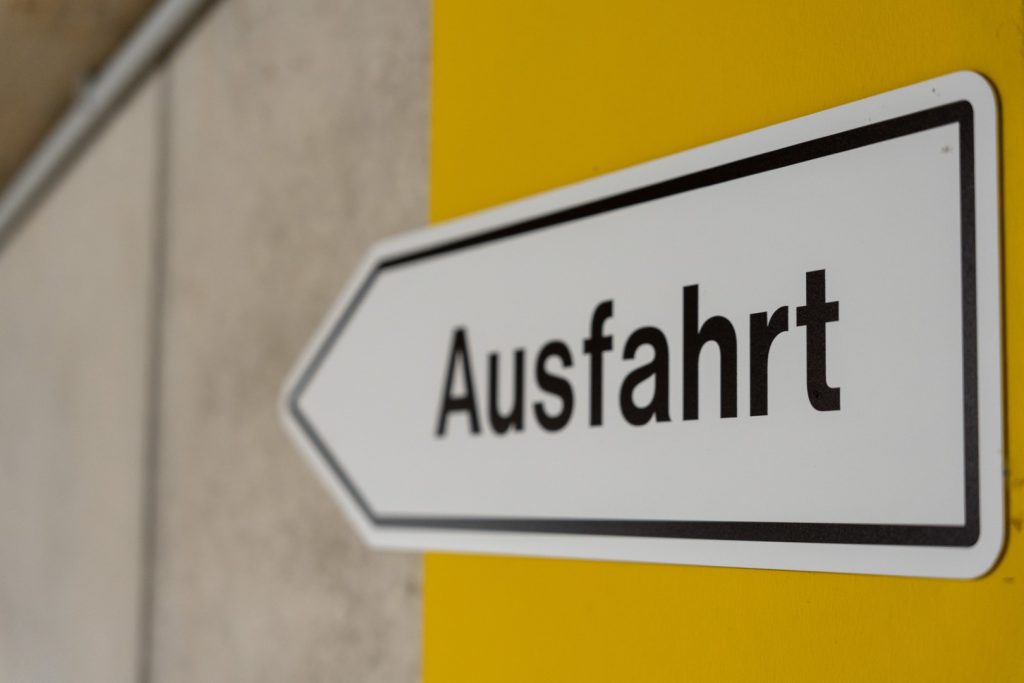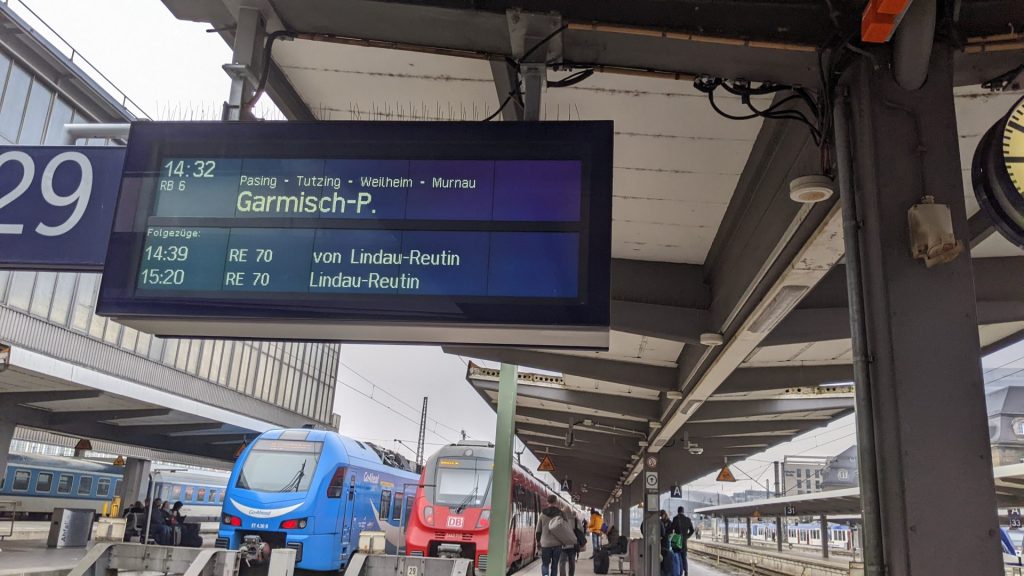If you’ve been around WanderInGermany for any stretch of time (if this is your first time- Oh. hey there!) then you know my biggest embarrassment in regards to being the go-to Germany Travel Blogger. I hate admitting this out loud every time because I don’t want it to discredit the work that I’ve done and let’s be honest, I don’t want you to think any less of me. But the reality is….
I live in Germany and I don’t speak German.

I could give you any slew of excuses (the first time we moved here was with the US military, where we were basically surrounded by English speakers, the second time we moved here, I had a baby soon after and just didn’t have the brain power to learn another language on 2 hours of sleep/night with 1 baby, 1 toddler, and another kiddo, my ADHD brain makes it veeeerry difficult to actually absorb languages….yada yada yada) but at the end of the day, that’s all they are: Excuses. After almost a decade of living in Germany, I should be waaaaay beyond the A1 level that I seem to be like a hamster in a wheel stuck at, despite the 4 (yes FOUR) A1 classes I’ve taken plus an entire A1 private course to try to get me into A2, I’m just convinced that my brain is not meant for being bilingual. So alas, here I am. Barely able to speak more coherently than my (now) 2 year old daughter.
Traveling to Germany For the First Time? You Might Be Interested in the Following Guides:
The Perfect 1 Week Germany Itinerary For First Timers
And as much as I seriously hate telling you that I don’t really speak German and that it makes me feel so bad, the reality is, you don’t NEED to know German when traveling in Germany (shoot….or even living here apparently!) And here’s why:
Over 50% Of Germans Can Speak English
Depending on the specific source you look at, there are differing exact numbers of just how many people speak English in Germany. The reason why there could be various stats on this is because when you ask a German if they speak English, it’s pretty common for them to say, “Not very much” (or even “No”) and then they go on to have a full conversation with you in English! Many Germans are a bit self-conscious of their English, especially when faced with a native English speaker, but the reality is that statistically speaking, at least over 50% of Germans know some English. The question of “how much” is I guess in the eye of the beholder!
English is Taught in German Schools
This varies state by state for their curriculum, but here in Bavaria, English becomes a compulsory class starting in the THIRD grade. And I’m not talking “Hey kids, let’s all learn to count to 10 in English!” kind of lessons (which is what my “Spanish” lessons did for most of my schooling) but instead, they are truly teaching the kids how to speak English in Germany. Like…really well.
Most People Under 40 Speak English
Because English is a main school subject in Germany, the reality is that most people under a certain age (typically around 40, but many even under 50) know some level of English. What I personally find pretty fascinating is the number of youth that speak amazing English. The reason? Social Media! I have a 15 year old babysitter who speaks English fluently and beautifully and while, yes, she has lessons in school, she admits that she predominantly watched TikToks and Youtube all in English which has propelled her language skills forward. And this is pretty common with the “young kids today” (said in my best Gramma voice).
Another reason for many people speaking English is the obvious one that it’s the “Language of Business.” Therefore, anyone who has a job in a field where they work with other nationalities (which is quite often when looking at a place like Europe) the default language for communication is almost always English.
Can You Go to Germany Without Knowing Much German and Still Get Around Easily?

Alright, so we now know that a lot of Germans can speak English, but you still may be wondering about how that affects TRAVELING in Germany without ANY German language skills. Is it OK to speak English in Germany? Is it true that Germans prefer speaking English with tourists? Is it rude to speak English in Germany? How do I get around Germany without speaking German? All of these are really common questions for people traveling to Germany for the first time. So let’s dive in!
You Will Get By In Germany With English
First, I want to address the people in the room who are all, “To really know, understand, and appreciate the culture, you MUST try to learn their language, speak to the locals, and enjoy the local way of living!!” And look, nobody here is saying that when you travel to Germany that you shouldn’t learn some basic phrases of German (you absolutely should, which is why I include my top German travel phrases below). But right now, I specifically am answering the most basic question at its core, “Can you travel to Germany without knowing German?” and the answer is simple: Yes.
But just because you can “Get by” doesn’t mean that everything will always be easy. I mean, it won’t be hard in most places, but yeah, there may be a few bumps in the road (like getting off at the wrong Ubahn station), simple misunderstandings (like when I once asked for a “chick” (Küken) instead of a “cake” (Kuchen) at the local Bäckerei), and maybe even a few frustrations. But, at the end of the day, we are in Germany. There has to be some level of “I knew what I was signing up for when I chose to travel to a country that doesn’t speak the same language as me.” Ya know?
And yes, of course meeting a local and learning about Germany through them is an amazing part of travel. But, I promise, this can actually still be done in English. Just because they are speaking English and not German doesn’t make the connections, memories, or information any less impactful.
English is Widely Spoken in Hotels/ The Tourism Industries

I never walk into any restaurant, hotel, or really any establishment without always first giving a basic greeting in German. If I know I am going to have to do some level of communicating, I always follow up with a friendly, “Sprechen Sie Englisch?” And I’m betting that more times than not if you are at a hotel, the receptionist will (basically) laugh as they say something very German like, “Ja, Naturlich!” Sure, there are times that you might be at a smaller mom and pop Pension/ Bed & Breakfast where it might be a bit more of a struggle, but generally speaking in most hotels, museums, main tourist sights, etc somebody will be able to help you in English.
But even “off the beaten path” travel in Germany is still decently possible. And even if you do find yourself in a location that doesn’t speak much English, Google Translate is a truly phenomenal tool!
Many Germans Prefer Their English Over Your Broken German
The whole concept of “You need to at least try saying something in German” is still completely applicable and you should never just walk straight into ANY place in a foreign country with your ‘Murican flag shirt, favorite baseball cap, and flip flops and just start demanding or expecting English to be spoken. That being said, let’s all just be honest for a minute. Most Germans’ English is far superior to the 3 months of Duo Lingo German that you tried to stick with.
But I also definitely have friends that suffer through my language learning woes because they don’t speak English. Seriously, I have THE best German friends! Most of the time, as I speak in nonsensical sentences (“sentences” is actually probably a generous term), they will patiently smile and nod at me despite having NO clue what I just (horribly attempted to) say. Some will gently feed me the word my brain is so desperately trying to find while others will even throw German “straight forward” stereotypes out the window and ever so delicately point out that I said “Das” instead of “Die” (seriously….why are there THREE ways to say “The!?”)
But MOST Germans? Especially ones who are busy waitresses or young hotel receptionists? Yeah. Two things will most likely happen:
1) They don’t have time to play the “What is this tourist trying to say to me” game and despite your best efforts, they often will just say something like, “It’s ok. It’s probably just easier in English.”
2) They’ll hear you speaking English and will go, “Yay! This is a great time to practice MY English!” Despite you maybe even being able to speak German half-decently, they often see a native English speaker as a great opportunity to help practice their own English.
Local Germans Are Quite Helpful
Germans have this stereotype that they are all rude, cold, and very serious. The reality is that most just don’t wear their emotions on their sleeves. However, I’ve rarely ever encountered a situation where a German wasn’t extremely helpful in a time of need. Whether it’s been me disheveledly schlepping a stroller off the train as one kid runs around and the other is strapped to my back in a carrier and several people always rush to come assist, or the time when there was construction on a railway and we had to do a whole hooplah of taking random buses and the Germans kindly explained exactly what we needed to do, or when the waiters who explain what a certain type of food is on the menu. I promise, even if they don’t start with a smile on their face, Germans are extremely helpful people!
Cities vs Small Towns vs “Off the Beaten Path”
So I hope by now, you’ve figured out that the majority of what has been said so far are pretty generalized statements. So when I say that, “Many Germans Speak English” you still need to take that with a grain of salt. In fact, let’s look at this a bit more in depth:
English in Big Cities: If you are hitting up the main tourist places like Munich, Berlin, and other big cities, English is going to be very easy to use. Like, it is surprising sometimes just how much English is spoken. Menus will almost always have an English version and just getting around in general will be a cinch, even if you need to ask for help or directions.
English In Small Towns: I live in Regensburg, which is a city of 150,000 people, and even here, I (obviously and shamefully) live my life almost all in English. As someone who lives here, I obviously have a few extra hurdles and obstacles (speaking to my kid’s teachers, calling to pay my electric bill, etc) but in my general day to day life (and even doctors and appointments) English is generally not a huge problem.
English in Small German Villages/ Countryside/ Off the Beaten Path: But then there are those small towns that are just so darn cute and classic “Germany”! We all want to visit all those “Quintessential German Villages.” If they are a tourist destination, despite their size, English still shouldn’t be a huge issue. However, if they are truly a local, completely off the tourist path location (like an ancestral village or your high school exchange student’s hometown) then it might get a bit dicey. If you go into a gas station in a small village, then sure, maybe that person won’t speak a word of English. But again, this isn’t a BAD thing! After all, as the general tourist, you are probably just doing stuff like eating out at delicious local restaurants (Google Translate that menu!) or just Wandering In Germany, which doesn’t require a ton of communication.
English in “East” vs West Germany
One thing to note about traveling through Germany in general though is the differences that can still be seen in what used to be “East Germany” (AKA Communist Germany) and what was “West Germany.” The Iron Curtain didn’t fall until 1989. That was just barely over 30 years ago. And if you go to towns that used to be in East Germany, it’s still obvious in many places that they didn’t have the same access to capitalism, money, etc. One of the ways this has trickled down is that people in the Soviet Satelite weren’t encouraged to speak English much. So, while English isn’t UNCOMMON today in places that were once East Germany, they are still definitely “catching up” to the rest of Germany. I was even surprised when visiting places like Dresden, which is a large, well visited city. While I didn’t struggle with not knowing much German, it was still obvious that not as many people spoke English compared to cities that were in the “West” like Munich, Frankfurt, etc.
The exception to this statement is Berlin. In fact, Berlin is the #1 city in Germany that has the most English speaking people. (But, if you know history, you know how complex the East/West Berlin topic really is and that not all of it was East Germany anyway)
Can You Drive in Germany Without Knowing the Language?

One of the really great things about driving in Europe is that there is a pretty standard use of pictures instead of words for road signs! This makes driving in Germany without knowing any actual German so much easier! Granted, there are a few signs that do contain words. And I don’t care how old you are or how long I’ve lived in Germany. The word, “Ausfahrt” for exit is funny. Another German road sign that is typically written out that you DO need to know is “Einbahnstrasse” which is “One Way Road.”
Other than that, be sure you’ve read up on my “Ultimate Guide to Driving in Germany” which goes into all the different signs you need to know, some driving rules that will be different from what you are used to, and yes…I address the all-looming questions about driving on the Autobahn!
Is It Hard to Navigate the Trains in Germany Without German?

With the use of cell phones, google maps, and the very useful Deutsche Bahn App (which can be used in English), taking the trains in Germany is actually pretty easy, even if you don’t know the language. The hardest part is probably going to be figuring out the exact ticket you’ll need (like the Deutschland 49 Euro Ticket vs the Bayern Pass) but figuring that out is more about deciding what fits your travel best and not even a language issue. Even knowing How to Buy a German Train Ticket isn’t hard (with this guide). On the trains themselves, the ticket checker may not always speak English, but if you have your ticket, just smile nicely, offer them your ticket, and all will be fine. This is a great example of how using context clues (“Oh hey, this person in a Deutsche Bahn uniform is walking around looking at things. I may have no clue what he actually just said to me but I bet it has something to do with wanting to see my ticket!”)
Personally, even though I live here, I still use my Deutche Bahn App when traveling in places I’m not super familiar with because it offers real time travel updates. So, it will even say when to get off at a stop (Google Maps can also do this for most places). You can also use the App (DB) to tell you what train tracks to be at, etc so again, German isn’t absolutely necessary for getting around.
Tips for Traveling in Germany Language
ALWAYS Start With a Basic Phrase in German
It doesn’t matter if you know that someone will most likely speak English or even if you know that after saying “Grüß Gott” (A way to say “Hello” in Bavaria) that you are going to immediately ask if they speak English. It is always best when you are in a foreign country to at least attempt a few words. This gesture isn’t about actually speaking or understanding the language. If you truly know no German, then it is a sign of respect that you are in their country. You will probably get a lot further showing that you are making an effort.
Hand Gestures
I may look a fool, but hand gestures, waving, and pointing can actually get you decently far in communicating sometimes!
If the person you asked doesn’t speak it, someone nearby most likely will
If I’ve asked someone if they speak English (and they don’t) then my next step is to attempt to quickly do a Google Translate of my question, request, etc. This usually suffices, but if not, then it’s extremely common for the local person you are talking to to tell you to wait a minute while they “Go find a colleague.” If you find yourself on the street needing help (particularly in a city) if the person you asked can’t help in English, try the next person. Statistically speaking, if over 50% of the population can speak SOME English, it is typically easy enough to find one to help.
Enjoy The Ride of Traveling Abroad
Most of us don’t travel to foreign countries to get the same food, experiences, sights, and experiences that we could in our own backyard. But that doesn’t mean that travel is always the glorious and amazing dream we see portrayed on Instagram. Sometimes, there aren’t hiccups along the way, especially if there are language barriers or miscommunications. Whenever I find myself in a situation when traveling abroad that feels frustrating, I remind myself that this is all part of the journey (literally and figuratively!) and instead of getting frustrated or mad, to just go with the flow! (Ok, ok…easier said than done, I know!)
Use Google Translate!
Google Translate is seriously my lifeline when I need to actually communicate in Germany! There are so many different ways to use it, so I made a quick tutorial on 5 different ways to use it to help you communicate as you travel.
Pro Tip: Make sure you’ve downloaded the language “German” in your profile (Don’t worry, I show you how in the video) so that you can even use it completely offline and without data.
Basic Phrases ALL Travelers Should Know
| Sprechen sie English? | Do You Speak English? |
| Bitte/ Danke | Please/ Thank You |
| Entschuldigung | Excuse Me |
| Es Tut Mir Leid | I’m Sorry |
| Wo ist… ? | Where is… |
| Nach Eins | Another One (IE: Nach Eins Bier Bitte) |
| Bit Zahlen | The Bill Please |
| Was kostet das? | What Does This Cost? |
Speaking English In Germany FAQs
Is it OK to speak English in Germany?
While it’s always respectful to know a few basic phrases in any foreign country you visit, yes, it is acceptable and is not seen as being rude if you are speaking English.
How common is English spoken in Germany?
Over 50% of all Germans know some level of English. Especially with the younger generations, it is easy to find people who speak English very well.
Do German locals speak English?
Many Germans speak English throughout the country. You are more likely to find people who speak English in bigger cities, younger generations, and business people. However, since English is a required part of the curriculum in school, even in smaller villages, it is not completely uncommon.
Can you live in Germany if you only speak English?
As someone who has been stuck at an A1 level for yeeeeaaars, I can say that yes. It is possible to live in Germany without speaking German. Obviously, this may be highly dependent on your exact location (if you live in a small village vs a city), your job (I obviously work at home, by myself writing in English!), and your visa requirements. I’m also not saying that it is always easy. But yes, it is possible.
Can you go to Germany without knowing much German and still get around easily?
Yes. Especially if you are doing a lot of the typical German highlights for tourists, those locations are very easy to get around with no German.
Sources/ Citations: https://www.statista.com/statistics/1337198/english-language-skills-people-germany/







